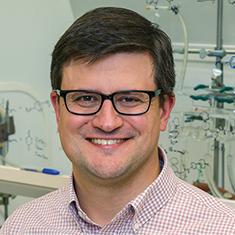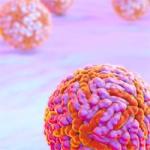
John 'Jay' Schneekloth, Jr., Jr., Ph.D.
Senior Investigator
Chemical Biology Laboratory
NCI/CCR
Research Topics
Targeting RNA with Druglike Small Molecules
The identification of selective RNA- and DNA-binding small molecules has been a longstanding challenge for chemical biology. Recent studies have demonstrated that while more than 85% of the human genome is transcribed into RNA, just 3% of those transcripts code for protein sequences. Coupled with the discovery that non-coding functions of RNA can drive disease, RNA has emerged as an intriguing but challenging therapeutic target for small molecules. In particular, regulatory nucleic acids that drive the expression of clinically important but so-called "undruggable" proteins such as c-MYC and KRAS respresent targets of interest. Our laboratory aims to advance the field of targeting RNA with druglike small molecules on multiple fronts. We use an integrated approach, including chemical biology, medicinal chemistry, structural biology, and functional genomics to understand and control RNA targets with small molecules. WIth respect to discovery, we have developed a small molecule microarray (SMM) high throughput screening platform that allows us to rapidly identify and profile the RNA-binding properties of small molecules. We use hits from this screening platform as the basis for development of small molecule probes that selectively target RNA. This work has led to the discovery that druglike compounds are suitable starting points for inhibitor discovery efforts for RNA targets, while driving fundamental advances in understanding RNA-small molecule recognition. Together, this work aims to develop RNA-binding small molecule probes to improve our understanding of RNA-mediated processes and disease states, particularly for cancers with no existing treatment options.
Biography
Dr. Schneekloth received his undergraduate degree from Dartmouth College in 2001 where he worked with Prof. Gordon Gribble. He then moved to Yale University and obtained a Ph.D. from the chemistry department with Prof. Craig Crews in 2006. As a graduate student he studied natural product total synthesis and developed the first cell-permeable PROTAC molecules. He then pursued an NIH postdoctoral fellowship with Prof. Erik Sorensen at Princeton University where he worked on the development of a new multicomponent reaction and the application of this reaction to the synthesis of analgesic natural products. He returned to Yale in 2009 where he worked as a medicinal chemist at the Yale Small Molecule Discovery Center. In 2011, Dr. Schneekloth joined NCI where his research involves using synthetic chemistry and high throughput chemical biology approaches to develop chemical probes of RNA, with a particular emphasis on targeting RNA with druglike small molecules.
Selected Publications
- Kim YS, Keyser SG, Schneekloth JS Jr. Synthesis of 2',3',4'-trihydroxyflavone (2-D08), an inhibitor of protein sumoylation. Bioorg Med Chem Lett. 2014;24(4):1094-7.
- Sztuba-Solinska J, Shenoy SR, Gareiss P, Krumpe LR, Le Grice SF, O'Keefe BR, Schneekloth JS Jr. Identification of biologically active, HIV TAR RNA-binding small molecules using small molecule microarrays. J Am Chem Soc. 2014;136(23):8402-10.
- Kim YS, Nagy K, Keyser S, Schneekloth JS Jr. An electrophoretic mobility shift assay identifies a mechanistically unique inhibitor of protein sumoylation. Chem Biol. 2013;20(4):604-13.
- Noblin DJ, Page CM, Tae HS, Gareiss PC, Schneekloth JS, Crews CM. A HaloTag-based small molecule microarray screening methodology with increased sensitivity and multiplex capabilities. ACS Chem Biol. 2012;7(12):2055-63.
- Kim J, Schneekloth JS Jr, Sorensen EJ. A chemical synthesis of 11-methoxy mitragynine pseudoindoxyl featuring the interrupted Ugi reaction. Chem Sci. 2012;3(9):2849-2852.
Related Scientific Focus Areas



Molecular Biology and Biochemistry
View additional Principal Investigators in Molecular Biology and Biochemistry


This page was last updated on Monday, January 12, 2026